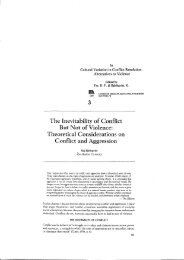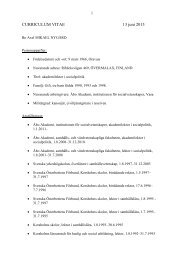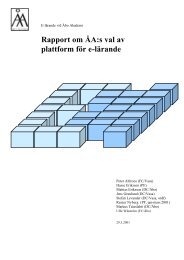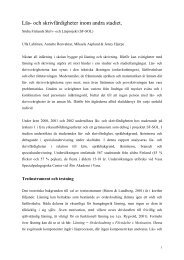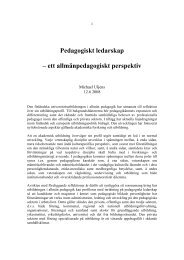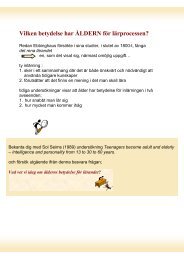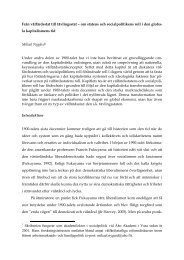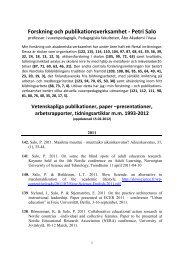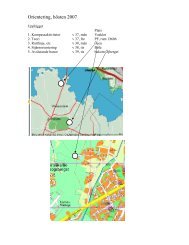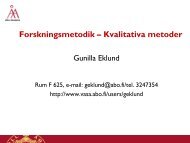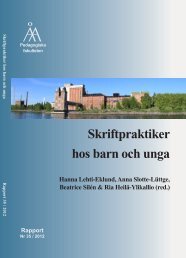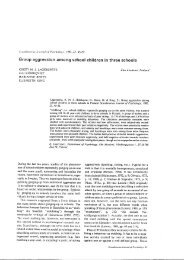Parties, Candidates and Citizens On-Line - Åbo Akademi
Parties, Candidates and Citizens On-Line - Åbo Akademi
Parties, Candidates and Citizens On-Line - Åbo Akademi
You also want an ePaper? Increase the reach of your titles
YUMPU automatically turns print PDFs into web optimized ePapers that Google loves.
organizational, financial […] resources…” (Norris 2001, 239; cf. Margolis & Resnick<br />
2000, 66). The major Finnish parties <strong>and</strong> their c<strong>and</strong>idates are the dominant political actors<br />
on-line. The patterns of real world politics in Finl<strong>and</strong> are replicated on-line.<br />
Regarding the Finnish citizens’ political activity on-line, this thesis has mostly<br />
provided findings which support the reinforcement theory. Currently, even though the<br />
country has a long history of high internet penetration, the Finnish population by-<strong>and</strong>large<br />
is still not ‘tuning in’ to internet politics (cf. Hill & Hughes 1998, 183). <strong>Citizens</strong> seek<br />
<strong>and</strong> place significantly more emphasis on political information from traditional sources<br />
than on-line sources. The socio-economic patterns found in traditional political interest,<br />
activity <strong>and</strong> engagement were also, on the whole, replicated among Finnish citizens<br />
seeking <strong>and</strong> placing information in on-line political information. Finnish citizens also do<br />
not appear to have become activated <strong>and</strong> engaged on-line, as evident from the analysis of<br />
on-line discussions. Some findings which do not entirely support the reinforcement<br />
theory do also merit attention: the thesis has shown that there could be a potential for a<br />
growing political “internet generation”. The youngest voters, regardless of other socioeconomic<br />
traits, are more prone to visit <strong>and</strong> to place emphasis on the on-line political<br />
information than the older generations. Furthermore, the thesis also found that neither<br />
class nor income, both of which are commonly used indicators of traditional political<br />
activity, proved significant predictors of seeking out <strong>and</strong> placing emphasis on any on-line<br />
political information. Nevertheless, looking at the general picture, the findings provided<br />
vis-à-vis the on-line activity by Finnish citizens generally support the reinforcement<br />
theory. The thesis’ second article showed that the new generation of Finnish voters<br />
appear to give significant importance to internet-based information in shaping their<br />
voting decisions. The fifth article, however, showed that the on-line opportunities for<br />
political discussion fail to activate <strong>and</strong> engage citizens (cf. Boogers & Voerman 2003, 25).<br />
This indicates a rather supplementary role for the internet in providing “information<br />
shortcuts” (Downs 1957) for those already likely to be politically interested (cf. Boogers &<br />
Voerman 2003, 25). While the young Finnish voters might be seeking information from<br />
new <strong>and</strong> more accessible sources (cf. Downs 1957; Norris 1999, 85), on-line politics is still<br />
not turning even these young people into ‘political animals’ (Davis 1999, 8).<br />
Returning to the typology of on-line political environments, then, the current<br />
situation in Finl<strong>and</strong> resembles a ‘no-change’ situation in as much as the on-line activity of<br />
both the political actors <strong>and</strong> the citizens follows familiar patterns. This corresponds to<br />
position A in the typology. Even though the Finnish case contains several contextual<br />
conditions which a priori suggested a potentially innovative <strong>and</strong> dynamic on-line<br />
environment, there is little evidence of internet politics showing signs of affecting off-line<br />
politics in Finl<strong>and</strong>. Whether this is due to the pull- or push effects discussed in this thesis’<br />
theoretical framework is hard to assess in light of the empirical evidence presented.<br />
181



